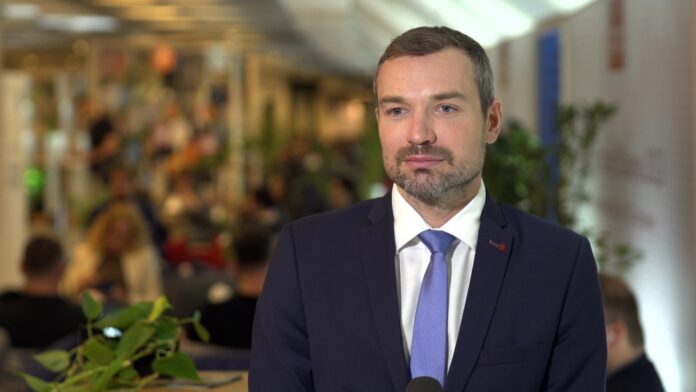The majority of Polish investments are located in Europe, but the United States, India, and the Middle East are becoming increasingly popular. According to the NBP, the value of Polish direct investments abroad was 130.5 billion PLN at the end of 2022. The most active in this respect are companies from the industrial processing sector, mining and extraction, and trade. In their conquest of foreign markets, they can count, among others, on the support of the Bank Gospodarstwa Krajowego (BGK), which finances investments and acquisitions of Polish companies abroad, and also supports Polish exporters.
Over the past few years, we have been observing growing interest from Polish firms not just in exporting, but also in capital expansion,” Piotr Kuffel, Director of the Foreign Expansion Office at Bank Gospodarstwa Krajowego, told Newseria Biznes. “Polish companies are increasingly boldly entering foreign markets, first and foremost large companies that want to place their resources mainly in safe Western European and North American countries. However, we have recently seen a growing interest from small and medium-sized enterprises as well.”
According to Eurostat, the number of dependent units of Polish firms abroad increased by 7 percent between 2013–2019, reaching 1,670 entities. At the same time, the revenues of domestic companies from this title increased by as much as 33 percent to reach 33.13 billion euros. GUS statistics show that at the end of 2021, exactly 1,900 companies with their headquarters in Poland (190 up from the previous year, an increase of 1.1 percent) showed involvement in 4,246 units abroad in the form of shares, branches or other forms (4030 in the previous year, an increase of 5.4 percent). Most of these foreign units had their headquarters in Germany, the Czech Republic, Ukraine and the United States. In total, Polish entities invested their capital in 114 countries in 2021.
– In the expansion of Polish companies, the directions associated with the European Union still dominate. We are talking specifically about Germany, where we recognize the problem of succession, mainly dealing with the takeover of existing companies. The next market is the United Kingdom because Brexit has led to Polish companies wanting to be closer to their end customers, deciding to set up factories there – says Piotr Kuffel.
According to last year’s PwC and PFR TFI report, a whopping 84 percent of Polish direct investments abroad are located in Europe. Importantly, in 2021, Polish BIZs grew at a faster pace than before the pandemic, and the rebound in foreign investments after COVID-19 occurred even faster than after the 2008 crisis. In 2021, the largest absolute increase was in foreign investments to the United Kingdom, which might have been due to the implementation of investments that had been postponed due to Brexit. Other countries where companies from Poland have increased their investments include countries in Central and Eastern Europe, such as Croatia (an increase of 200 percent), Lithuania (130 percent), and the Czech Republic (50 percent). On the other hand, investments in distant directions also grew strongly: the United States (an increase of 480 percent), India (200 percent), and Brazil (370 percent). However, analysts point out that the size of Polish foreign investments is still relatively low, which in practice means that one large transaction in a given country can significantly boost dynamics. For example, the inflow of investment from Poland to the United States, the world’s largest economy, amounted to 83 million euros in the first three quarters of 2021. The construction of one large factory usually costs more.
– The United States, which plays a very important role in the global economy, is also a crucial direction for Polish expansion. It is a huge market and we see a lot of interest in both locating new production capacities there and capital expansion through the acquisition of existing enterprises – says the director of the Foreign Expansion Office at BGK.
The NBP report “Polish Direct Investments Abroad in 2022″ shows that at the end of last year, receivables from Polish direct investments abroad amounted to 130.5 billion PLN. That’s about 21 billion PLN more than in 2021. As NBP analysts explain, the increase had its source in higher direct investor engagement both in shares and other forms of capital shares and a high level of re-investment of profits, as well as repayment of liabilities by Polish direct investors to their foreign subsidiaries. Statistics show that such investments are primarily the domain of industrial processing as well as trade and mining and extraction. GUS adds to this list also companies from the automotive repair, construction, communication, transport, and warehouse economy sector.
– Recently we have been noticing great interest in expanding within the recycling industry. In this area – keeping the urban mining and increasingly important issue of the recovery of natural resources from the secondary loop in mind – many Polish companies see a significant growth potential worldwide. An example would be the Elemental Group, which invests in the United States, takes over American recyclers but also invests in new production plants in Asia and Europe – Piotr Kuffel points out. – For the Polish economy, the automotive sector is also very important, producing in Poland for foreign OEMs [car manufacturers – ed.], but also developing local production plants in factories located in India, China, and Mexico.
As shown by last year’s research conducted by PwC, among companies that are already present abroad, nearly 60 percent declare their intention for further expansion – 45.5 percent in the form of new investments, and 13.8 percent in the form of mergers or acquisitions. However, the situation looked opposite in the group of companies not investing abroad – 80.3 percent of them had no specific plans in this regard. This shows that companies, which have already experienced the specifics of foreign activities, see that it’s profitable. The more experience a company has in foreign markets, the more it is open to benefits associated with internationalization, which includes diversification and risk reduction, securing supply chains, or reducing operating costs.
Plans for foreign expansion of Polish companies mainly concern Europe. However, there are some differences – in medium-sized companies, Central and Eastern Europe clearly dominates as a direction for foreign investments. While among large companies, they are more distributed between Europe, Central Asia, and North America.
The Ministry of Development and Technology points out that institutions supporting such expansion, which include the Foreign Expansion Fund, operating within the framework of the Polish Development Fund, the Export Credit Insurance Corporation (KUKE) and the Bank Gospodarstwa Krajowego (BGK), which finances investments and acquisitions of Polish companies abroad, but also supports Polish exporters, play an important role in undertaking foreign investments by Polish companies.
– The support of Polish companies and the type of this support is dependent on the stage of internationalization of a given company. Small companies that are just thinking about entering the global market will need different support, and different expectations will be expected from companies that have already established themselves on this market – explains the expert from BGK. – In the first case, trade-supporting instruments are particularly helpful, securing business relations with new contractors. Here the key and most frequently used instrument is an export letter of credit. On the other hand, in the case of large enterprises that have been operating in international markets for years, we see a great demand for financing working capital associated with growing export revenues, as well as financing new investments located in Poland aimed at increasing export sales.”
The support offered by BGK in the field of export and foreign expansion for Polish firms is a wide range of tools, which can be divided into three segments. The first segment is products strictly aimed at export support, offered together with KUKE as part of the government’s Financial Export Support program.
– The second segment is precisely the support of Polish entrepreneurs’ foreign capital investments, who are seeking financing related to the establishment of a new factory abroad, or the takeover of foreign competition – Piotr Kuffel lists. – The third type of support is local financing related to the development of export activities, namely the financing of both working capital and investment needs directed at the export.
The latest company to take advantage of BGK support during foreign expansion is the Malopolska company BiBP, a producer of innovative “bag in box” packages, designed for packaging and storing liquid and semi-liquid products. The company obtained a long-term investment loan insured by KUKE from BGK, amounting to several million euros, which allowed it to acquire a majority stake in the Spanish company Montibox SL, based in Andalusia. The acquisition will strengthen BiBP’s competitive advantage by increasing production capabilities, acquiring nearly 30 years of know-how and a customer base, and easier access to new sales markets. The Polish company will thus become one of the European leaders in the “bag in box” packaging sector.
Spain is already the 86th market in which BGK financially supports Polish entrepreneurs in their foreign expansion. In 2014, there were only nine.

















